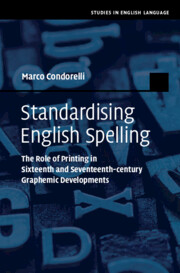 Standardising English Spelling
Standardising English Spelling Book contents
- Standardising English Spelling
- Studies in English Language
- Standardising English Spelling
- Copyright page
- Contents
- Figures
- Tables
- Acknowledgements
- Abbreviations
- Chapter 1 Introduction
- Part I Context
- Part II Empirical Method
- Part III Case Studies
- Chapter 7 The Standardisation of Positional Spellings
- Chapter 8 The Standardisation of i and y
- Chapter 9 The Standardisation of Etymological Spelling
- Chapter 10 The Standardisation of Vowel Diacritic Spelling
- Chapter 11 Conclusion
- Bibliography
- Index
Chapter 11 - Conclusion
from Part III - Case Studies
Published online by Cambridge University Press: 31 March 2022
- Standardising English Spelling
- Studies in English Language
- Standardising English Spelling
- Copyright page
- Contents
- Figures
- Tables
- Acknowledgements
- Abbreviations
- Chapter 1 Introduction
- Part I Context
- Part II Empirical Method
- Part III Case Studies
- Chapter 7 The Standardisation of Positional Spellings
- Chapter 8 The Standardisation of i and y
- Chapter 9 The Standardisation of Etymological Spelling
- Chapter 10 The Standardisation of Vowel Diacritic Spelling
- Chapter 11 Conclusion
- Bibliography
- Index
Summary
The conclusion summarises the main points developed in the book, and provides more explicit answers to the questions posed at the beginning. From a large-scale perspective, the role of the printing press on the development of Early Modern English spelling was not only undoubtedly important; it was, I conclude, the primary agent responsible for shaping and disseminating a modern graphemic standard over the sixteenth and the seventeenth centuries. In theoretical terms, the patterns of development detected in my case studies suggest something peculiar about spelling standardisation in Early Modern English. Underneath the umbrella of standardisation, there are multiple processes of large-scale regularisation, which in turn are the motor of spelling standardisation itself. The history of Early Modern English spelling is not just part of a history of standard orthography, but also, perhaps even especially, a history of individual spellings. The chapter ends with suggestions for future research and some considerations about the relationship between the findings made in my piece of research and those from previous contributions.
- Type
- Chapter
- Information
- Standardising English SpellingThe Role of Printing in Sixteenth and Seventeenth-century Graphemic Developments, pp. 214 - 223Publisher: Cambridge University PressPrint publication year: 2022


